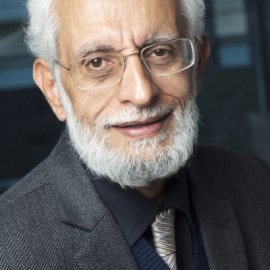Literature, Jamia Millia Islamia, New Delhi, India

Octobre 2013 à Juin 2014
Alok Bhalla obtained his Master’s from the University of Delhi and PhD from Kent State University (USA). He was a Lady Davis Visiting Professor at the Hebrew University of Jerusalem, Fellow at the Rockefeller Bellagio Centre (Italy) and Fellow at the Indian Institute of Advanced study, Shimla.
After his retirement as Professor from English and Foreign Languages University, Hyderabad (EFLU), he taught literature at Jamia Millia Islamia and Ambedkar University, Delhi. His publications include Stories about the Partition of India (4 volumes), Partition dialogues, Cartographers of Hell (on the Gothic novel) and Politics of Atrocity and Lust (on the vampire tale), books on translation and Saadat Hasan Manto. His research papers have appeared in Journal of Peasant studies, Manoa, Kunapipi, Economic and Political Weekly, etc. He has translated plays by Dharamvir Bharati, Krishna Baldev Vaid, and Satish Alekar, a novel by Nirla Verma, as well as stories and poems by Intizar Husain, Gulzar, Kedarnath Singh, etc. He also edited Yatra; writings from the Indian Subcontinent (6 volumes). Forthcoming is his volume of Nonsense Verse for children, Tongue-Twisting Tales. A published poet, he has participated in literary festivals in Jaipu, Mumbai, Chennai, Chandigarh and Karachi. Widely traveled, he has lectured at Moscow, Yaroslaval, Yangon, Haifa, Dhaka, Heidelberg, London, Berkeley, Honolulu and Atlanta.
Strangers and the strangeness of the sacred: animals, birds, fish, snakes, demons and gods as prophets in miniature paintings of the Ramayana from Chamba.
This project is an attempt to critically ‘read’ a set of eighty seven miniature paintings which constitute the visual narrative of the Ramayana by artists of the Chamba valley, in northern India, painted between 1760 and 1800 AD. These paintings, which have not been closely analysed as significant visual narratives ought to be, are part of a wonderfully rich archive of visual mythmaking in India. Alok Bhalla argues that these miniatures are not mere illustrations of specific incidents in the Ramayana and that they make no attempt to translate verbal poetry of the epic by Valmiki into equivalent visual images. In these paintings, the Chamba artists offer a new visionary understanding of the mythic story as well as a critical rereading of the original epic.
Like the finest of imaginative thinkers, these miniature painters explore the notion of ‘good’ and ‘evil’. Their painterly responses to the exile of Rama from the structures of power and city states focus our attention on the abundance of earth’s beauty in form of the animals, birds and demons, forcing us to pay attention to the uncommon idea that human beings must extend sympathy to all that may appear ‘strange’ on earth. Indeed, because it is only through a mutually sustaining dialogue between human beings and the ‘strange’ that human societies can become responsible again and the earth find resources for its regeneration.
BHALLA, Alok. Stories About the Partition of India. Vol. I-IV. New Delhi : Manohar Publishers, 2011, 1232 p.
BHALLA, Alok. Andha Yug: Or The Age of Darkness a play by Dharamvir Bharati (Translation and critical introduction). Honolulu : University Of Hawai'i Press, 2012, 60 p. (coll. Manoa).
BHALLA, Alok. Partition Dialogues: Memories of a Lost Home. New Delhi : Oxford University Press, 2008, 258 p.
BHALLA, Alok. The place of translation in a Literary Habitat and Other lectures. Mysore : Central Institute of Indian Languages, 2003, 62 pages. (CIIL Foundation Day Lecture Series).
BHALLA, Alok (in collaboration with Adil, V.). A Chronicle of the Peacocks: Stories of Partition, Exile and Lost Memories by Intizar Husain (Translation from Urdu). New Delhi: Oxford University Press, 2002, 276 p.